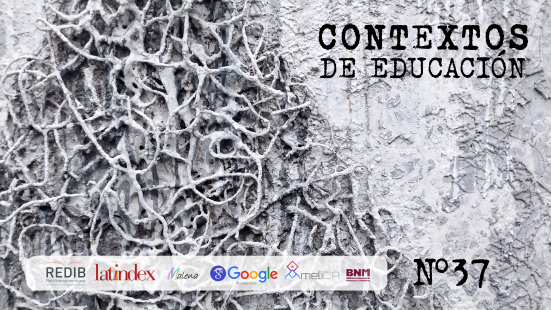Assessment in physics during the first year of Engineering at the National University of Río Cuarto
Keywords:
Evaluation, Academic affiliation, Evaluation activities, Teaching and evaluation, Formative evaluationAbstract
In the first year of engineering courses at the National University of Río Cuarto, topics related to Classical Mechanics are covered in the subjects Introduction to Physics (first semester) and Physics (second semester). One of the recurring problems faced by the course is the high level of failure and dropout. Although the causes of this situation are diverse, academic ones are a prevalent factor. The entry activities for the Engineering degree at the National University of Río Cuarto aim to develop content related to Newtonian Mechanics, which allows establishing a minimum level of knowledge to begin taking the subject Introduction to Physics. With the experience accumulated in the activities for beginning university life, it was proven that the evaluations on this subject constitute a very important diagnostic tool that reveals an academically vulnerable population. The early detection of these groups would lead to proposing alternatives that surpass the traditional evaluation used in the area of Physics, focused only on the accreditation of content through partial exams. The development of alternative assessments to evaluate the acquisition of skills and/or competencies specific to the subject is an innovation in the area of Physics. This allows for feedback regarding daily practices in the classroom and is strongly linked to the process of knowledge construction, rather than simple monitoring and accreditation through partial exams, as an equivalence for the completion of learning and appropriation of Physics models by students.
References
Anijovich R. y Cappelletti G. (2017). La evaluación como oportunidad - 1a ed. Paidós.
Casco, M. (2009). Afiliación intelectual y prácticas comunicativas de los ingresantes a la universidad. Revista Co-herencia, 6 (11), pp. 233-260. https://www.redalyc.org/pdf/774/77413098013.pdf
Consejo Federal de Decanos de Ingeniería (2005). Proyecto Estratégico de Reforma Curricular de las Ingenierías 2005-2007. Documento Preliminar. Daniel Morano, Osvaldo Micheloud, Cristóbal Lozeco. XXXVII Reunión Plenaria. Santa Fe. 4 al 6 de mayo.
Ezcurra, A. M. (2009). Educación Universitaria: Una Inclusión Excluyente. Corresponde a la Conferencia Inaugural, Tercer Encuentro Nacional sobre Ingreso Universitario, organizado por la Universidad Nacional de Río Cuarto (1-3 de octubre de 2008, Argentina).
Feldman, D. (2015). La formación en la universidad y los cambios de los estudiantes. En: María Civarolo, M. Lizarriturri, M. G. (Comps.) Didáctica general y didácticas específicas: la complejidad de sus relaciones en el nivel superior. 1a ed. Universidad Nacional de Villa María.
Fernández, A.; Vicario, J.; Venier, F.; Amieva, R. (2017). Trabajando la argumentación en las carreras de ingeniería en la universidad: en el cursillo de ingreso y en el primer año del cursado. Revista de Enseñanza de la Física, Vol. 29, No. Extra, pp. 315–322. https://revistas.unc.edu.ar/index.php/revistaEF/article/view/18491
Fernández, A.; Vicario, J.; Venier, F.; Amieva, R., Ortiz F. (2010). Avances y limitaciones de una propuesta para el aprendizaje virtual de la Física y el mejoramiento de las condiciones de acceso a Ingeniería. World Congress & Exhibition ENGINEERING 2010-ARGENTINA, October 17th–20th, Buenos Aires, AR
Mariani, E., Morandi G., Ros M., (2019). La docencia universitaria frente al desafío de la inclusión educativa: un análisis de las perspectivas de docentes de primer año. Trayectorias Universitarias, 5(8). https://revistas.unlp.edu.ar/TrayectoriasUniversitarias/article/view/8641
Morchio, I. L., Difabio de Anglat H., Berlanga L. (2015). Factores que condicionan la puesta en práctica del aprender. Aprender a aprender. Como meta de la educación superior. Teseo.
Rodríguez, A. & Clariana, M. (2017). Procrastinación en estudiantes universitarios: su relación con la edad y el curso académico. Revista Colombiana de Psicología, 26(1), 45-60. doi: 10.15446/rcp.v 26n1.53572
Venier, F., Vicario, J., Fernández, A., Amieva R., Ortiz, F. (2010). La relación entre el rendimiento académico en Física en el examen de ingreso y la percepción de los alumnos acerca de la formación que brinda la escuela media, y su importancia para la planificación del curso de ingreso a ingeniería. World Congress & Exhibition ENGINEERING 2010-ARGENTINA October 17th–20th, 2010, Buenos Aires, AR
Venier, F.; Ceballos, C.; Vicario, J.; Fernández, A.; Amieva, R.; Ortiz, F. (2011). La relación entre el rendimiento académico en Física en el examen de ingreso y la percepción de los alumnos acerca de la información que brinda la escuela media: su importancia para la planificación del ingreso a Ingeniería. https://www.unrc.edu.ar/descargar/sintesis-inst2019.pdf
Venier, F., Ceballos, C., Fernández, A., Ortiz, F. (2012). Análisis y propuestas en Física para el ingreso a Ingeniería. Jornadas IPECyT. San Juan. Argentina.
Vicario, J. (1994). El aprendizaje como superación de los modelos representativos. Science and Mathematics Education for the 21st. Century: Towards Innovatory Approaches, Concepción (Chile). Páginas 599 a 607.
Downloads
Published
Issue
Section
License
Política propuesta para revistas que ofrecen acceso abierto
Aquellos autores/as que tengan publicaciones con esta revista, aceptan los términos siguientes:- Los autores/as conservarán sus derechos de autor y garantizarán a la revista el derecho de primera publicación de su obra, el cuál estará simultáneamente sujeto a la Licencia de reconocimiento de Creative Commons CC BY-NC-SA 2.5 AR que permite a terceros compartir la obra siempre que se indique su autor y su primera publicación esta revista.
- Los autores/as podrán adoptar otros acuerdos de licencia no exclusiva de distribución de la versión de la obra publicada (p. ej.: depositarla en un archivo telemático institucional o publicarla en un volumen monográfico) siempre que se indique la publicación inicial en esta revista.
- Se permite y recomienda a los autores/as difundir su obra a través de Internet (p. ej.: en archivos telemáticos institucionales o en su página web) antes y durante el proceso de envío, lo cual puede producir intercambios interesantes y aumentar las citas de la obra publicada. (Véase El efecto del acceso abierto).

